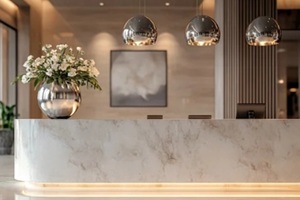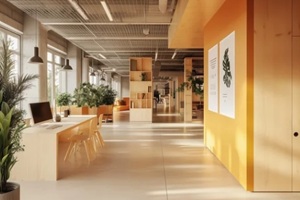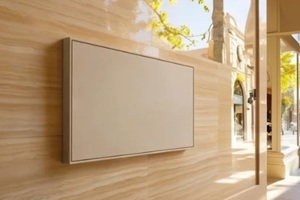 Commercial spaces come in a range of functions and environments. From the busy halls of a hospital to the vast stretches of walls enclosing a warehouse, these buildings are limited only by what goes on inside them.
Commercial spaces come in a range of functions and environments. From the busy halls of a hospital to the vast stretches of walls enclosing a warehouse, these buildings are limited only by what goes on inside them.
It is important to carefully consider the materials used in a building’s construction to make the most of its space. Custom wall coverings are one option that is accessible and adaptable, but businesses should be cognizant of the factors that impact both function and aesthetics when it comes to wall coverings.
For instance, custom wall coverings can be made of many types of materials in varying thicknesses. Some respond especially well to sound, while others resist impact and protect interior walls from damage.
Here are some tips on how to choose the right materials for durable and stylish custom wall coverings in commercial spaces, no matter which industry you call home.
What Are Wall Coverings Made Of?
Wall coverings are an adaptable type of décor that serves both functional and aesthetic purposes. In general, custom wall coverings will be made of vinyl, a robust material suitable for a range of common uses. However, depending on the project, other variants of customized wall coverings may be made of different materials.
For instance, if a business wants wall panels, these could be crafted from metal (as with wainscoting). To get the best idea of what suits your business, ask the professionals whether a material other than vinyl might be a good match for you.
Choosing the Right Materials
Whether you select a custom vinyl wall covering or something else, there are a few factors to keep in mind as you make this decision for your business. Be sure to think about:
Thickness
Custom wall coverings are not a one-size-fits-all option for commercial spaces. In fact, it is their customizability that makes them so appealing! Thinner wall coverings may be the most affordable, leaving companies with plenty of budgetary room to completely transform their entire space.
 Alternatively, thick wall coverings are ideal for areas with heavy traffic, such as hospitals and schools, where objects may strike the walls regularly. These come at a higher cost, but they are durable and easy to clean. A wall covering somewhere in the middle of these two thicknesses can offer a mixture of these advantages.
Alternatively, thick wall coverings are ideal for areas with heavy traffic, such as hospitals and schools, where objects may strike the walls regularly. These come at a higher cost, but they are durable and easy to clean. A wall covering somewhere in the middle of these two thicknesses can offer a mixture of these advantages.
Additionally, the thickness of a wall covering impacts more than just durability. Thick wall coverings provide more effective wall insulation, which can reduce drafts and make the building’s heating and cooling systems more efficient, which is directly tied to the price of utility bills.
Acoustic efficacy
Wall coverings are more than just aesthetic installations. Using textured wall coverings can also prevent sound from bouncing throughout the room, thus reducing or eliminating echoes and loudness. In spaces such as medical facilities or law offices where quiet and confidentiality are paramount, choose a wall covering material that supports this goal.
Alternatively, if a space feels stifling, consider glossy wall coverings that can help to spread ambient noise throughout the area. These glossy coverings can also reflect light from nearby windows, brightening the space without using electricity.
Customization
Wall coverings are so versatile because they are customizable. From featuring your logo in a prominent location to choosing colors and patterns that draw the customer’s eye and direct their attention to a target location, wall coverings can serve many purposes. Choose materials that align with how you plan to decorate the space.
For instance, if you hope to feature a naturalistic theme with rich greens and browns, consider wall coverings made from materials appropriate for mimicking bamboo or wood. Wall coverings can be made to match natural materials such as wood and stone, but this effect is not as feasible with some of the rarer covering materials, such as metal.
Sustainability
 Many types of wall coverings contain VOCs, or volatile organic compounds. If sustainability is on your company’s radar, be sure to consider whether the materials that make up the wall covering were sustainably sourced or how much greenhouse gas their manufacturing created.
Many types of wall coverings contain VOCs, or volatile organic compounds. If sustainability is on your company’s radar, be sure to consider whether the materials that make up the wall covering were sustainably sourced or how much greenhouse gas their manufacturing created.
Some wall coverings are available in paper or natural fiber versions to reduce harm to the planet.
Get the Right Wall Covering for Your Commercial Space
Every commercial space should consider not just how it serves its customers and employees but also the space in which these valued individuals will spend their time. Custom wall coverings can provide a durable and stylish way of enhancing a commercial building, but selecting the right materials for the job is paramount for accomplishing your goals.
Contact Tree Towns or call at (630) 931-0117 to speak with a professional who can advise you on the ideal materials for your use case or to share your vision and bring it to life with custom wall coverings!
